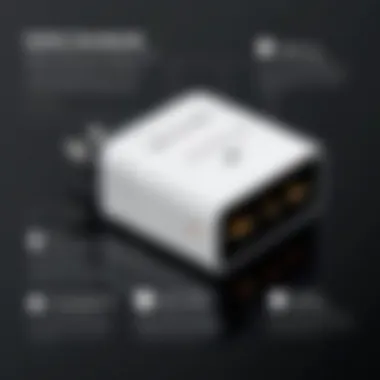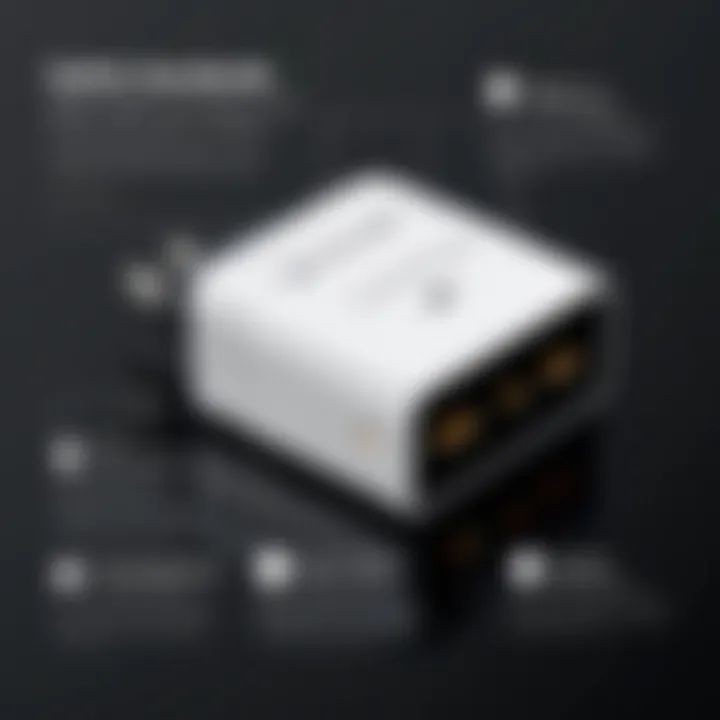Detailed Insights on USB Power Adapter 5V 2A


Intro
The USB power adapter with specifications of 5V and 2A is an essential component in today's electronics landscape. These adapters are widely used to power devices ranging from smartphones to tablets and various peripherals. Understanding the specifications related to these adapters can enhance users' experience and improve device performance.
This comprehensive guide delves into the technical specifications, compares various models, examines practical applications, discusses current trends, and provides valuable buying advice. A focus on how these adapters serve different types of users will also be highlighted. This wealth of information aims to arm tech-savvy consumers, gamers, PC builders, and everyday users with knowledge that improves their purchasing choices and user experience.
Technical Specifications
Detailed Product Specs
The USB power adapter typically functions within a voltage range of 5V and operates at a current of 2A. These values define its output capabilities, ensuring that devices drawing power can receive the energy they need effectively. The most common output connector is the USB Type-A, although USB Type-C has gained prominence due to its versatility and fast-charging capabilities.
Performance Metrics
Performance metrics such as charging speed and energy efficiency are vital. With a 5V 2A adapter, the power output is 10 watts. This is generally sufficient for charging most smartphones and smaller tablets reasonably fast. However, optimal performance also depends on compatibility with the connected device and its own specifications.
Compatibility Information
Typically, these power adapters are compatible with USB devices that require similar voltage and current levels. Common devices include smartphones, tablets, e-readers, and small electronic gadgets. However, devices like laptops may require higher specifications to charge effectively. It is crucial to always check the requirements of the device being used to avoid any potential damage or inefficient charging.
Product Comparisons
Feature Comparisons
When comparing various USB power adapters, consider the following features:
- Size and Portability: Some adapters are compact and easy to carry, while others may be bulkier.
- Cable Quality: The quality of the USB cable can significantly affect charging performance.
- Brand Reliability: Established brands often provide more reliability and better safety features.
Price Breakdown
Prices for these power adapters can vary widely based on brand and features. High-end models may offer advanced technology such as fast charging capabilities, while budget options may lack important safety certifications.
User Experience Breakdown
User experiences can provide insight into real-world performance. Many users report that charging times can vary based on the device being used with the adapter. Generally, devices optimized for 2A charging will perform at their best.
Practical Applications
Use Cases for Different Users
Different users might find varied applications for a 5V 2A USB power adapter. For instance:
- Everyday Users: Generally need it for smartphones and personal electronics.
- Gamers: May utilize it for portable gaming devices.
- PC Builders: Often use these adapters for powering smaller peripherals without needing a full power supply.
Recommended Configurations
It is advisable to use these adapters with quality USB cables to maximize performance. Using a short cable decent quality cable tends to improve charging efficiency compared to long or inferior cables.
Multi-Platform Performances
Devices spanning multiple platforms may also use these adapters. Implementing them with devices that support various charging voltages and currents can lead to efficient and effective charging cycles. Users with multiple devices often benefit from using a single adapter across all gadgets.
Latest Trends
Industry Developments
The shift towards USB Type-C connectors showcases the adoption of more versatile charging options. These connectors allow for faster data transfer and charging capabilities compared to traditional USB connections.
Emerging Technologies
As technology evolves, more adapters are being equipped with smart charging features. These features ensure that the optimal voltage is delivered to the device being charged.
Future Predictions
As the demand for fast charging continues, it is forecasted that the market for USB power adapters with increased output specifications will grow. Innovations in materials and technology will likely lead to more efficient adapters.


Buying Guides
Recommended Products
When considering a purchase, look into brands like Anker, Aukey, or Belkin. These companies offer reliable options with good customer reviews.
Purchasing Tips
Always check the compatibility of the power adapter with your device specifications. Additionally, ensure you are obtaining a model with proper safety certifications.
Warranty and Support Information
Foreword to USB Power Adapters
USB power adapters have become essential components in our technology-driven world. They provide the necessary power to charge and operate a myriad of devices, from smartphones to tablets and various electronic gadgets. Understanding the role and specifications of these adapters is vital for consumers seeking efficiency and performance.
A USB power adapter typically converts AC voltage from a wall outlet into a lower DC voltage that is compatible with portable devices. The significance of their function extends beyond merely providing power; proper specifications can influence charging speed, device compatibility, and safety.
In the context of this article, the focus is on the 5V 2A specification, which is commonly found in many devices. With a 5-volt output and a 2-amp maximum current, these adapters serve a wide range of applications. This specification is particularly beneficial for devices requiring moderate power, ensuring they charge effectively without overloading.
Understanding Power Specifications
Power specifications are critical for assessing the suitability of a USB power adapter for specific devices. At 5V and 2A, this adapter outputs a total of 10 watts, adequate for powering smartphones, small tablets, and even some wearable gadgets. The balance between voltage and current ensures the device receives an optimal charge, contributing to longevity and performance.
When discussing power specifications, it is essential to understand the relationship between volts and amps. Voltage serves as the force that pushes electrical currents through a circuit, while amperage measures the flow of electricity. Therefore, a device designed for 5V 2A will draw the required power without risking damage from excessive current.
Importance of USB Standards
USB standards play a fundamental role in ensuring compatibility and performance across various devices. Established by the USB Implementers Forum, these standards include specific guidelines regarding voltage, current, and data transmission capabilities.
Adhering to these standards guarantees that devices charge efficiently and safely. For instance, using a non-compliant adapter can lead to slower charging or even damage. The universal nature of USB standards promotes a seamless user experience, allowing consumers to use one adapter with multiple devices. This interoperability is a significant advantage in a world where technology is constantly evolving.
"Using a proper USB power adapter ensures your devices receive safe and adequate power, minimizing the risk of damage and enhancing performance."
Technical Overview of 5V 2A USB Power Adapters
Understanding the technical specifications of a USB power adapter rated at 5V and 2A is vital for both consumers and developers. These specifications give insights into how effectively these adapters can charge devices. The relevance of the technical overview here lies in its ability to connect theoretical knowledge with practical applications. Knowing how voltage and current function helps make informed decisions in selecting the right adapter for specific needs. This section aims to clarify the complexities behind the numbers.
Voltage and Current Explained
When discussing USB power adapters, voltage and current are foundational concepts. Voltage, measured in volts (V), is the electrical potential difference. In the case of USB power adapters, the standard output voltage is 5V. This specification is crucial as it ensures compatibility with a wide range of electronic devices like smartphones and tablets.
On the other hand, current, measured in amperes (A), represents the flow of electric charge. A USB adapter with a rating of 2A means it can provide a maximum of 2 amperes of current. This capacity influences how quickly a device can charge. For example, if a device is designed to draw 1A, a 5V 2A adapter will charge it adequately without any strain. However, if a device attempts to draw more than 2A from such an adapter, it risks overheating or suffering damage unless adequate protections are in place.
Efficiency Ratings and Performance
Efficiency in USB power adapters relates to how well the device converts electrical input into usable output without significant energy losses. A higher efficiency rating can indicate that the adapter produces less waste heat, contributing to overall performance. Generally, efficiency ratings can range from 80% to 95% in quality adapters. This factor is key for tech-savvy users who value both speed and safety.
Furthermore, an efficient adapter generally extends the battery life of connected devices. If devices can draw their required power without wasting much energy, it limits the potential for overheating and thereby increases longevity.
In real-world applications, specific models might also incorporate smart technology, enabling them to recognize connected devices to deliver optimal current and voltage based on requirements. This feature can enhance user experience significantly.
"Selecting a USB power adapter goes beyond mere specifications. Understanding the interplay of voltage, current, and efficiency can profoundly affect device performance and lifespan."
In summary, a solid grasp of voltage and current concepts, coupled with an awareness of efficiency ratings, allows users to maximize their USB power adapters. This knowledge is essential for optimizing electronic performance.
Common Applications of USB Power Adapter 5V 2A
The USB power adapter with a specification of 5V and 2A plays a critical role in the daily operations of many electronic devices. Understanding the common applications of this adapter helps consumers recognize its value and impact across various sectors. The strength of this adapter lies in its versatility and compatibility, making it a staple in both personal and professional environments. This section will explore how this power adapter is utilized across different devices and industries, shedding light on its benefits and considerations.
Usage in Mobile Devices
Mobile devices, such as smartphones and tablets, represent a significant portion of the usage of the 5V 2A USB power adapter. These devices often require a reliable and efficient power source to ensure optimal performance. The 2A current capacity allows for faster charging compared to standard 1A chargers. This capability is particularly beneficial for users who need quick recharges during busy days.
- Fast Charging: Many modern smartphones support quick charging protocols, and a 5V 2A adapter delivers the necessary current to enable faster charging times.
- Universal Compatibility: Most mobile devices are designed with USB charging capabilities, making the 5V 2A adapter a universally accepted power source.
- Convenience: Users can conveniently use the same charger for various mobile devices, reducing the clutter of multiple chargers.
Compatibility with Smart Gadgets


Smart gadgets have gained popularity, and their reliance on efficient power solutions is paramount. Devices like smart speakers, smartwatches, and fitness trackers often utilize USB power adapters for charging. The 5V 2A adapter is highly compatible with many of these gadgets.
- IoT Devices: As part of the Internet of Things (IoT), smart gadgets enhance functionality with constant power supply; thus, the 5V 2A adapter ensures that the devices remain operational without interruptions.
- Versatility: This adapter can power not only personal gadgets but also smart home devices, offering a seamless charging solution for a varied set of tools.
- Reduced Energy Consumption: A well-rated adapter utilizes power efficiently to charge devices, aligning with the energy-saving practices that many users prefer.
Integration in IoT Devices
IoT devices are increasingly part of everyday life, from smart thermostats to connected kitchen appliances. The integration of 5V 2A USB power adapters into these devices underscores their ability to efficiently manage energy requirements in a wide array of applications.
- Consistent Power Supply: Many IoT devices operate continuously or require frequent updates; the 5V 2A adapter provides a steady power flow that supports certain functionalities while maintaining their operational efficiency.
- Scalability: As IoT ecosystems expand, devices often need reliable power that can scale with them. The 5V 2A adapter meets these requirements, accommodating multiple devices from a centralized power source.
- Interoperability: Most IoT devices are designed to work with standard adapters, allowing users to select the best power source without worrying about compatibility issues.
In summary, the 5V 2A USB power adapter's applications in mobile devices, smart gadgets, and IoT devices showcase its flexibility and importance in modern technology. Understanding these applications can help users make informed choices when investing in power solutions for their electronic devices.
Compatibility Considerations
Compatibility is a crucial factor when selecting a USB power adapter, particularly the 5V 2A model. A thorough understanding of this aspect is essential for ensuring optimal performance and efficiency in powering various devices. Compatibility considerations encompass device compatibility, cables, and connectors, ultimately influencing user experience and device functionality.
Device Compatibility
When discussing device compatibility, it is important to examine which gadgets can work effectively with a 5V 2A USB power adapter. Devices such as smartphones, tablets, and Bluetooth speakers typically find this adapter sufficient for charging purposes. However, always check the manufacturer's specifications to ensure the device can safely handle this power output.
Many devices are designed to negotiate power requirements, meaning they can request and utilize the most suitable power output from the adapter. This feature lets the device maximize charging speed without causing damage. Conversely, using an incompatible adapter could lead to slow charging or, in worst-case scenarios, damage to the device. Therefore, understanding your device’s power needs will guide effective adapter selection.
Cables and Connectors
Cables and connectors play a significant role in the overall compatibility of a 5V 2A USB power adapter. USB Type-A and Type-C connectors are commonly used, but selecting the right cable is essential for achieving optimal performance. For example, a high-quality cable ensures the device receives the correct voltage and current without significant loss.
Using low-quality cables may result in excess resistance, leading to heating issues and reduced charging efficiency. It is advisable to use cables that adhere to USB standards to avoid complications.
- High-Quality Cables: Ensure that the cable's gauge is sufficient for 2A currents to minimize power loss.
- Connector Type: Be aware of the type of connection your device requires, as Type-A, Type-B, and Type-C all have specific applications.
In summary, compatibility considerations involve a detailed analysis of both the devices' requirements and the right cables and connectors. Prioritizing these factors leads to improved charging performance and device longevity.
"Choosing the right USB power adapter is not just about matching voltage. It impacts device performance, efficiency, and safety."
Understanding and navigating compatibility is essential for tech-savvy consumers, gamers, PC builders, and everyday users. By making informed choices regarding device compatibility and selecting high-quality cables, users can maximize the benefits of their USB power adapter.
Market Overview of 5V 2A USB Power Adapters
The market for USB power adapters, specifically the 5V 2A variant, has seen significant evolution due to the increasing reliance on portable technology. Many devices, ranging from smartphones to smart home gadgets, require efficient power solutions that can deliver reliable performance. Understanding the market dynamics is crucial for consumers who intend to make knowledgeable purchasing decisions that align with their device requirements.
One important factor to consider is the demand for universal compatibility. The 5V 2A USB power adapter is often a standard choice for many devices, facilitating widespread use. This ubiquitous nature leads to many options in the market, therefore, consumers might find it challenging to choose the right adapter for their needs. Decisions should factor in not just compatibility, but also performance, safety, and efficiency ratings, which can vary widely among brands.
"When it comes to selecting a USB power adapter, informed choices are essential. A poor choice can lead to device malfunction or even damage."
Brand Comparisons
Various brands dominate the 5V 2A USB power adapter market, each offering unique features that appeal to different segments of consumers. Established brands like Anker, Belkin, and Aukey are often recommended due to their track records in performance and safety.
- Anker: Known for high-quality build and innovative designs. They often incorporate multi-port systems, allowing users to charge multiple devices simultaneously.
- Belkin: Focuses on enhancing user convenience with products designed for seamless integration and efficiency. They guarantee reliability across different gadget types.
- Aukey: Stands out with competitive pricing while providing solid performance metrics, making it a preferred choice for budget-conscious tech users.
The choice between these brands may depend on personal experiences, recommendations, and specific use cases. Users might prioritize aspects like charging speed, durability, and portability based on their lifestyle and usage patterns.
Price Variations and Factors
Pricing of 5V 2A USB power adapters can vary significantly, typically ranging from around $5 to $30 or more. Several factors contribute to this variability:
- Brand Prestige: Well-established brands usually command a higher price due to perceived quality and customer service.
- Features Offered: Some adapters come with advanced features such as surge protection, fast charging capabilities or include multiple output ports, influencing their price.
- Material Quality: High-quality materials that ensure greater durability typically raise production costs, which is reflected in the final retail price.
- Warranty and Support: Products with extended warranties and better customer support may present higher prices but can offer peace of mind for the consumer.
Safety Standards and Regulations
Safety standards and regulations play a crucial role in the functionality and reliability of USB power adapters. They ensure not only the protection of devices but also the safety of users. The voltage and current specifications, like those seen in the 5V 2A USB power adapter, must conform to certain guidelines to prevent accidents, such as electrical shock or device damage. Understanding these standards can help users select the right product and use it safely.
Certification Requirements
Certification of power adapters is often mandated by regulatory bodies. These certifications may include CE, FCC, and UL. Each of these guarantees that the product has undergone rigorous testing for safety and quality. When a USB power adapter holds these certifications, it signifies compliance with safety norms. Users should always look for these markings to ascertain the adapter's credibility.


For example, CE marking indicates conformity with health, safety, and environmental protection standards. UL certification ensures devices have been tested for safety in North America. Choosing certified products reduces the chances of overheating and electrical failures. In the long run, this not only protects connected devices but also diminishes risks to users.
Understanding Overvoltage and Overcurrent Protection
Overvoltage and overcurrent protection are essential features in USB power adapters. Overvoltage refers to a situation where the voltage exceeds the expected level, while overcurrent pertains to excessive current flowing through the device. Both issues can cause significant damage to electronic devices and pose safety hazards.
Many modern adapters incorporate built-in safeguards against both overvoltage and overcurrent. These protections automatically cut off power when unsafe conditions arise, preventing potential damage. Users should be aware that not all adapters offer these protections. Thus, when selecting a USB power adapter, it is advisable to opt for models that explicitly state their overvoltage and overcurrent protection capabilities.
"Safety certifications are not just stickers; they are assurances of quality and protection. Always check before buying."
Being informed about safety standards and regulations ensures better choices for the consumers. It promotes the longevity of devices and user safety. Understanding these elements is vital for anyone who relies on USB power adapters for everyday technology.
Potential Challenges and Limitations
The focus on potential challenges and limitations regarding USB power adapters, particularly those rated at 5V and 2A, is crucial for tech-savvy individuals. While the specifications of these adapters often indicate compatibility and efficiency, there are underlying factors that can lead to suboptimal performance or even device damage. Understanding these challenges can inspire more informed decisions and reduce the risk of mishaps.
Adaptation Issues with Newer Devices
As technology evolves, newer devices often come with upgraded charging requirements, which can create adaptation issues. Many recent smartphones, tablets, and smart gadgets may demand higher amperage or different voltage levels for optimal charging. This is where a 5V 2A adapter can fall short.
One of the main issues occurs when a newer device requires a charging speed that exceeds what a standard 5V 2A power adapter can provide. For example, some devices may support 3A or 5A charging, designed to exploit fast-charging protocols such as Qualcomm Quick Charge or USB Power Delivery. Using an underpowered adapter may lead to very slow charging, hinder performance, or even charge interruptions.
Additionally, the hardware inside newer gadgets can often misinterpret the 5V 2A input. Devices might restrict their functionality or throw up alerts if they detect obsolete charging standards. Such scenarios highlight the need for users to not only understand their current USB power adapter specifications but also to keep pace with industry advancements.
Impact of Low-Quality Products
When considering USB power adapters, the market is saturated with various brands and products, not all of which maintain high standards of quality. Choosing a low-quality USB power adapter can have significant consequences for your devices' performance and safety.
Low-quality adapters often do not adhere to safety regulations and may lack necessary protective features like overvoltage and overcurrent protection. As a result, these components can damage devices they charge, leading to costly repairs or replacements. Additionally, inferior adapters can have poor heat dissipation, which increases the risk of overheating during prolonged use.
The reliability of the power output is another concern. A low-quality adapter might not consistently deliver the required 5V and 2A, causing erratic charging cycles. This inconsistency can degrade the battery life of devices over time, leading to unexpected shutdowns or reduced overall performance. To ensure the longevity and optimal functioning of your gadgets, it is always advisable to invest in reputable brands known for producing reliable power adapters and maintain compliance with established safety standards.
"In a world where electronic devices constantly demand more power, ensuring quality in power adapters is not just preferable but essential for device longevity and user satisfaction."
By addressing these challenges, consumers can make more educated decisions regarding their USB power adapters, guaranteeing both safety and efficiency in charging.
Future Trends in USB Power Adapter Technology
Understanding future trends in USB power adapter technology is crucial, especially for those who rely heavily on electronic devices. The advancements in this area impact both performance and user experience. The significant developments focus on increasing charging speeds, ensuring compatibility across various devices, and integrating smart technologies within the power adapters. These trends can lead to better efficiency, making charging processes more streamlined and effective.
Advancements in Charging Technology
The landscape of charging technology is evolving rapidly. Innovations in fast charging have emerged, allowing for higher current delivery without compromising safety. Power Delivery (PD) and Qualcomm Quick Charge are prime examples of this shift. These technologies regulate voltage and current intelligently, ensuring devices receive the appropriate power level. Users experience reduced charging times, which is particularly beneficial in everyday scenarios where quick recharges are necessary.
Moreover, the adoption of GaN (Gallium Nitride) technology in power adapters has improved efficiency. GaN allows for smaller, lighter adapters without sacrificing power output. These adapters produce less heat and can operate at a higher frequency, enhancing the charging experience for consumers. Thus, choosing a 5V 2A USB power adapter that incorporates these advancements ensures optimal performance.
Environmental Considerations
As technology progresses, so does the focus on environmental sustainability. Manufacturers are increasingly aware of the impact their products have on the ecosystem. The creation of energy-efficient USB power adapters is a direct response to consumer demands for greener technology. Certifications like Energy Star and EU Eco-Label play a vital role in guiding consumers towards environmentally friendly options.
Moreover, the industry is beginning to prioritize recyclable materials for adapter casings and packaging. This shift not only reduces waste but also encourages responsible consumer behavior. As tech-savvy individuals become more aware of their choices, opting for adapters that meet strict environmental standards becomes not just a preference, but a responsibility.
Incorporating these trends into the purchasing process invites consumers to play an active role in promoting sustainability while meeting their charging needs. Significant future changes in the USB power adapter sector will enhance overall efficiency, ensuring devices are powered effectively while minimizing harm to the planet.
Ending
The conclusion of this article serves to summarize the crucial insights about USB power adapters, particularly the specifications tied to the 5V 2A variant. It emphasizes the relevance of understanding these specifications for consumers, ensuring they are informed on how to select the right adapter for their needs.
The 5V 2A power adapter is not just about providing power; it is about ensuring compatibility with a wide range of devices. Choosing the right adapter can substantially affect device performance, charging speeds, and safety. Furthermore, insights into market variations reveal how different brands influence user experience. These factors are essential for tech-savvy consumers who prioritize not only functionality but also reliability in their devices.
"Knowledge is power" - understanding the specifications can lead to better purchasing decisions.
Recap of Key Points
A comprehensive understanding of the USB power adapter's specifications can lead to effective usage. Key points include:
- Specifications Understanding: Recognizing voltage and amperage is critical for its application.
- Compatibility: The wide array of devices that work with the 5V 2A adapter maximizes its utility.
- Quality Matters: Investing in reputable brands avoids potential dangers associated with lower quality adapters.
- Safety Standards: Compliance with safety regulations ensures protection against electrical hazards.
- Market Overview: Brand comparisons provide guidance in navigating diverse offerings in terms of price and features.
Final Thoughts on Selection and Use
When selecting a USB power adapter, consider both the technical specifications and the specific needs of your devices. It is essential to:
- Assess Power Requirements: Focus on what your devices truly need to avoid overloading.
- Prioritize Quality: Seek certified products from trustworthy brands to ensure both longevity and safety.
- Stay Updated: Technology advancements constantly influence adapter usefulness and efficiency. Keeping abreast of trends will guide effective selection over time.







